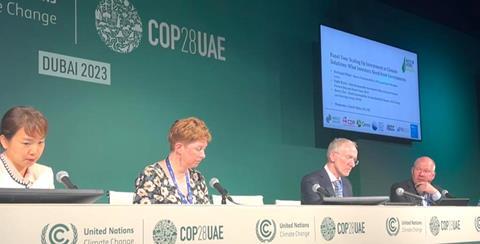COP28, the annual UN climate conference, convened on 30 November to 12 December 2023 in Dubai, United Arab Emirates (UAE). As indicated by the Intergovernmental Panel on Climate Change (IPCC) Synthesis Report, COP28 was a critical moment to define how the world will safeguard the planet’s liveability and course correct in global climate action.
The PRI had a delegation of 11 staff members on the ground, covening and participating in a wide range of events and meetings.
COP28 outcomes
Read David Atkin’s reflections of COP28.
PRI-hosted events
5 December | Investor Agenda | Accelerating and scaling up investor climate action to achieve the Paris Agreement’s goals
Time: 15:00–16:30
Location: SE Room 2 Blue Zone
To achieve the Paris Agreement’s goals, investors are setting net zero targets, laying out Investor Climate Action Plans (ICAPs), and engaging with companies and governments. This event, organised by the Investor Agenda founding partners (PRI, AIGCC, CDP, Ceres, IIGCC, UNEP FI), focused on the policies and frameworks needed for investors to drive a just transition to a net-zero economy.
6 December | The Sustainable Finance Forum, Dubai, UAE
Hosted by Climate Action, the PRI and UNEP FI, the Sustainable Finance Forum was one of the biggest finance sector events held alongside COP28.
As a key platform for open dialogue with the finance sector, the event provided 400 participants the opportunity to enhance collaboration, foster dialogue, promote clear standards, and drive sustainable practices across assets classes and portfolios.
The PRI and UNEP FI brought to the table banks, insurers and investors for discussions on decarbonization, as well as pioneering work on nature and biodiversity, adaptation, the Just Transition and leading research and best practices to identify, measure, disclose, and manage sustainability risks in the financial sector.
Our goal was to align sustainable finance with the real economy and enable a just transition to a net-zero, nature positive global economy.
PRI partnership with Global Ethical Finance Initiative | Path to COP28
The PRI partnered with the Global Ethical Finance Initiative (GEFI) on their ‘Path to COP28’ campaign, which draws together global financial institutions and stakeholders to leverage the role of the finance sector in the run up to and during COP28.
- COP28 Climate Finance Summit: Financing Survival. 4 December, 09.00-13.00, DIFC Atrium
- Unlocking Islamic Finance COP28 Summit, 5 December, 09.00-13.00, DIFC Atrium
- SDG Hive Programme, 6 (financing nature and biodiversity) and 7 December (investing in the SDGs), 09.00-16.30, DIFC Academy
More information on the campaign and registration links for the events can be found at: The Path to COP28 - An Integrated Year-Long Campaign - GEFI (Global Ethical Finance).













